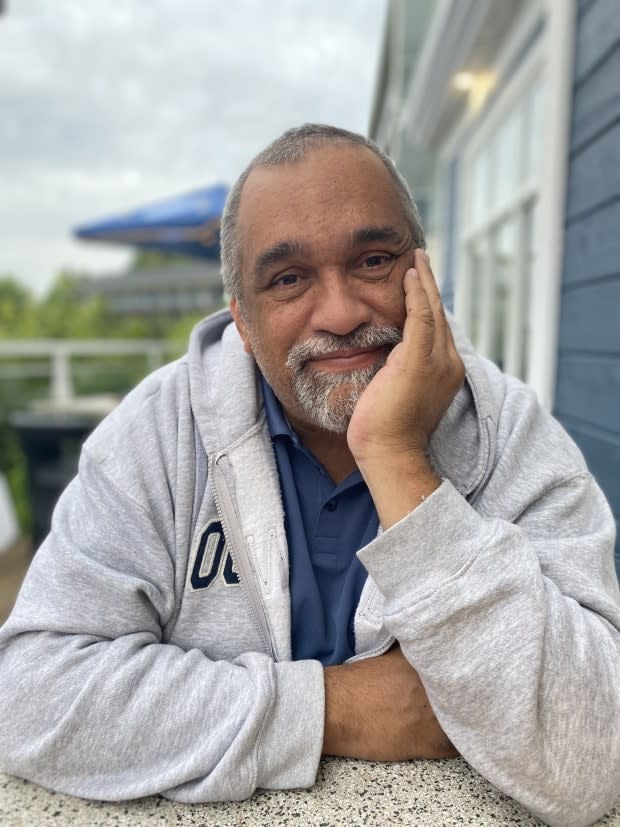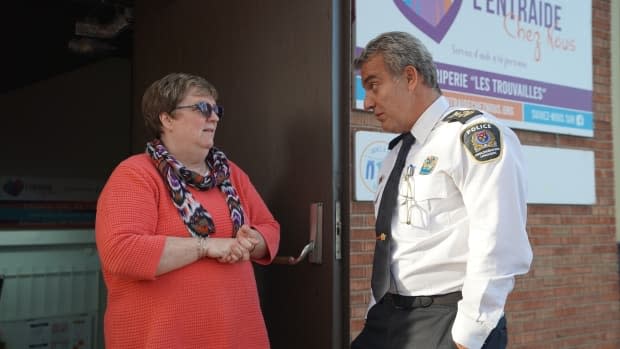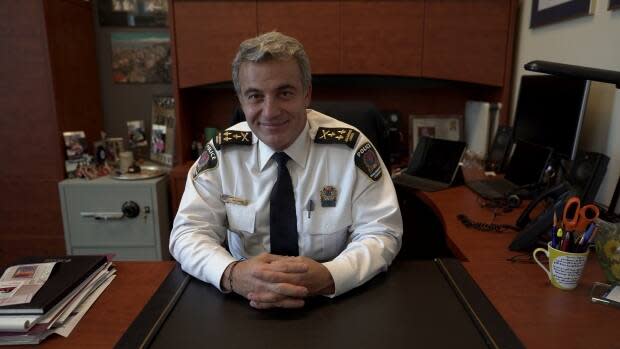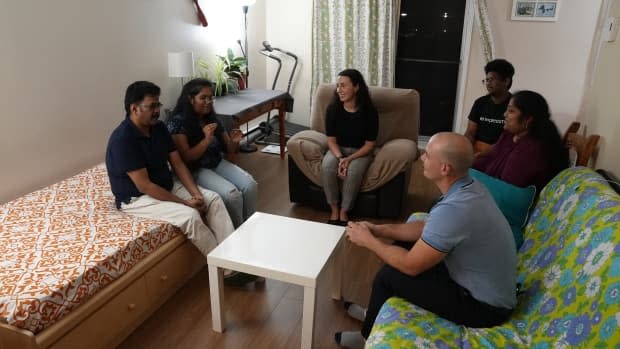No uniforms, no guns: How police officers in Longueuil, Que., are confronting bias

The call blares through the constant radio static. It's urgent. A man is standing by a busy road and says he wants to kill himself.
Patrol officers turn on their siren and expertly weave through busy traffic as they race to the scene. It's another mental health-care crisis and it happens all the time.
Officer Ghyslain Vallières is following behind in another cruiser. A former community-based officer, Vallières is now a spokesperson for the Longueuil police force on Montreal's South Shore.
The officers on patrol tonight have only been on the job for six months and will end up spending the rest of their shift convincing the man to go to hospital and escorting him there. Vallières said the reality of policing is not what many new graduates expect.
The '"dream that you had of your career as a police officer, at 20 years old … you think that you will fight the criminality, you think you will run behind a thief," he said. "Well, that's not the reality. The reality is there's a lot of crisis. There's a lot of people who have a lot of vulnerability."
Because of that, he said, the Longueuil force is "trying to have a program like immersion for them to know what's happening because it's going to be a part of their job for the future."

In Longueuil, the future of policing is already here. From suicide calls to checking in on people who haven't shown up at work for days, the majority of 911 calls have nothing to do with crime.
Most of the calls are nuanced and complex and officers may not be equipped to deal with them or may be responding in ways that only escalate a crisis. It's why the force created what it says is the only immersion program of its kind in the world where police are taken off patrol to step into the lives of people they're supposed to serve and protect.
Vallières said immersion is designed to "destabilize" rookies and veterans alike by stripping them of their uniforms and guns and more importantly, the sense of power that comes with them.
"It's hard sometimes to be human, to be connected to the person who is feeling something, so that's why we said: 'OK, first of all, connect with that person.Try to put yourself in their shoes.'"
It's a paradigm shift — to put the emphasis on compassion over control — and it begins by bringing officers back to the classroom, in this case a rented church hall.
Identifying biases
A group of 21 police officers from the SPAL (Service de police de l'agglomération de Longueuil) and other police employees meet to kick off the five-week immersion program that will see them spend time in places of worship, schools, community centers and even families' homes.
There is a lot at stake. The force is acutely aware that police across the country come under fire for profiling and use of excessive force.The program begins with a series of exercises designed to identify biases behind that.
Gabriela Coman is a sociologist and an anthropologist with SPAL who helped develop the program.

"This is very important because the immersion is about themselves, it's about the other, but it's about how you can grow up," said Coman. "How can you be a little bit different in your everyday life and professional life? They say frequently: 'I'm an open-minded person.' What does it mean exactly? Because everybody has a limit. In what context is your limit?"
On this day, they are playing a game designed to expose confirmation bias, or the tendency to interpret evidence as confirmation of one's existing beliefs. A set of numbers and letters appears on a large screen in the room.
The group is told that behind every even number is a vowel, and they're asked to test that theory. Most automatically select the cards with the even number and the vowel, confirming what they've been told is true, rather than challenging the assumption.
"In police work, we have our own perception on things, we have our ideas, but you have to look at it from another perspective,'' said Nicholas Beaucage, one of the police officers participating in the program. "It really brings us outside of our minds and into other peoples' as well to think differently."
Beaucage has been an officer for 18 years and just finished a secondment with a provincial sex trafficking task force. He plans to devote the next chapter of his career to community policing.
'Out of my element'
It's early morning and another unpredictable day is about to begin at École Vent Nouveau, an educational facility for young people with severe disabilities in Saint-Hubert on Montreal's South Shore. Most of the students are non-verbal and many have trouble with communication and regulating their emotions.
A small group of officers will spend two days here, observing how staff safely restrain students when necessary.
Beaucage is invited inside a small classroom where the teacher's voice remains hushed throughout the day and the lights stay low. Some students are sensitive to bright lights and noise. There is little interaction between the students themselves. Loud, isolated outbursts are common. Before long, Beaucage is visibly overwhelmed.
"I'm very out of my element, I'm very uncomfortable," he said. "It's uh, a very eye-opening experience, I would say."

Beaucage follows the students as they take a break from the classroom.
Vallières watches him from a distance.
"I'm seeing a guy actually who doesn't know how to deal with this situation," said Vallières. "When we are trained, we are trained to take control of the situation, take care of the situation, be in charge of something, always knowing what will be next. But here you don't control anything."
Calls to 911 can involve a person with disabilities and officers across the country have been accused of police brutality when responding.
Teaching moments
School director Jean Rivière says officers learn important lessons here.
"I think that the training of the police is to react firmly," he said, adding that what looks like aggressive behavior can be someone having a hard time regulating their emotions. "Instead of reacting maybe aggressively, they'll be able to understand that it's probably not violence."
There are many teaching moments here.

Beaucage intently watches as a group of aides wordlessly usher a teenager down a stairwell to a taxi waiting outside to take him home. They surround him with gym mats, creating a protective barrier for him and themselves. The boy is prone to violent outbursts and workers are visibly relieved when today's transition goes smoothly. As Beaucage watches, he's realizing what he can do to de-escalate a crisis, rather than add to it.
"Verbally they're doing nothing. They're just guiding him into a location for his safety. So now it brought my attention to the fact that any verbal command is not going to work and even the lights of the police car could have an impact, even the radio, the static sound. It all has an impact."
Shaking his head, Beaucage continues, "the game is different, you know, so I have to adapt my ways. It's not the person who's going to adapt, I have to adapt so it's a real eye-opener."
The immersion program started in 2019. The pandemic stalled it, but since resuming, 75 of the force's police officers have been through it. The goal is to have all of Longeuil's nearly 600 officers complete the program.
'It's not a revolution'
Police forces across the country and abroad have reached out to Longueuil police Chief Fady Dagher to find out more about the program. Dagher has been praised for launching it, with community groups, politicians and other police leaders calling him avant garde for coming up with something he says has been long overdue.
"If 70 to 80 percent of my calls are all social, mental health, people who are disturbed, how can we keep going on those calls and expect to give them a security answer?" he said. "Some people think that I want my cops to become a social worker. No, they are social actors, they're part of the community. This is what the community needs. So it's not a revolution.
"I still have my gun and my Taser, but my biggest weapon is my mouth."

On this day, Dagher has dropped by to see Mary Claire Macleod, director of L'Entraide Chez Nous, a community organization that runs a thrift store and a drop-in centre for people in need. Dealing with hostile behaviour is not uncommon, she said.
"When the guys were aggressive, I kept on saying: 'OK, wait, I'll make you a peanut butter sandwich, here's a glass of orange juice, and then we'll talk,'" said Macleod, who has run the group for 21 years. "I've never called the police."
Still, Macleod was one of the first community partners who agreed to host Dagher's officers.
"When immersion came in, I thought: 'That's what I'm going to teach them. I'm going to teach them to sit down. Patience. Listening. Empathy. Courage. And to know what that other person is going through. Can you imagine not having food on your table?'"
Dagher said immersion exposes all sorts of biases that haven't been challenged.

Dagher, who is of Lebanese descent, says he has been racially profiled. Members of his force, which is primarily white, have been accused of it, too.
"I think we are five per cent of visible minority police officers," said Dagher. "I can continue hiring visible minority police officers, but I told myself: 'You have to invest yourself in the white Québécois French Canadian police officers, you need them to change, to adapt.' If you are waiting for the Arab cop or the Black cop to come in the next 20 years, you're going to be still waiting….
"I want to change the culture right now."
A common thread
Part of changing that culture begins at home.
Beaucage has spent the last five weeks in a variety of settings, including meeting with survivors of intimate partner violence, and hearing from people struggling with mental health challenges and front-line workers who treat them.
Midway through the program, he's at a local youth center. As he joins in a game of Mario-Kart, he chats with them about what it's like being a police officer.
Beaucage said he wants young people to feel they can turn to the police. What strikes him so far about immersion, he said, is the common thread among the people he's met.
WATCH | Police learn about those they protect:
"It always comes down to the same thing," Beaucage said. "People just want to be happy and they just want to be heard and understood. And as police officers, I have to understand that, OK, I have a job to do, but my job is for the person and the environment and I have to always adjust myself to the person, to their capabilities and their needs."
That lesson continues when we catch up with Beaucage a couple of weeks later, at the final community-based event of the program.
Sharing dinner in a home
He and a colleague are spending the evening with Suresh Gundra and his family at their home in Saint-Hubert. The Gundras recently immigrated from India. As the aroma of several Indian dishes wafts through the apartment, the initial awkwardness gives way to genuine curiosity. Sixteen-year-old Olivia said she could never imagine having an officer over for dinner home in India.
"No way, no way. Oh, my God. The thought of it scares me."
Turning to Beaucage, she said, "I don't know, you guys feel just like us normal humans."

Gundra said her family is eagerly learning as much as they can about their new country, and wants officers to understand where they are coming from too.
"It's good that people, like police officers, are getting to know other perspectives, cultures because it's always important to know someone else's perspective," she said. "Especially with race and ethnicity, that's why there's discrimination."
'Easier to connect as humans'
It's a whole new lens for Beaucage, personally and professionally.
"It kind of tears down those barriers, you know, and it makes us easier to connect as humans, because you start to discover you have a lot more in common with people than you think."
The evening and the conversations lasted for several hours. When it's time to go, Beaucage is given a container of leftovers and he reaches out to hug his hosts goodbye.
He said it's the end of the program but just the start of seeing his job, and himself, in a new way.
"As a professional, as a police officer for 18 years, I've never experienced something this enriching in my life. Like nothing has come close to this.
"I'm already a better person. So if I'm a better person, I'm a better police officer."


